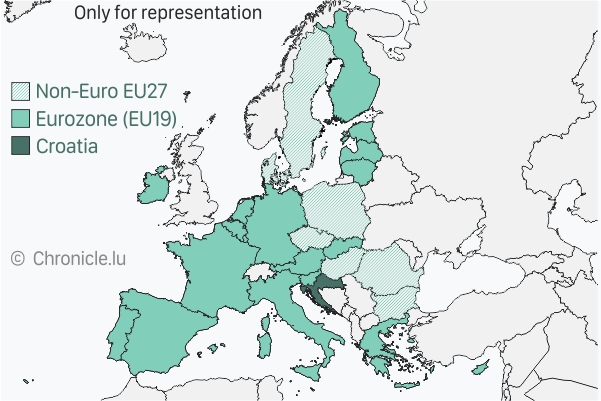
On Tuesday 12 July 2022, the European Council formally adopted the final required legal acts allowing Croatia to become the 20th member of the euro common currency, starting 1 January 2023 - a long-held expectation of the Croatian government and people finally set to be fulfilled.
Croatia, a largely mountainous country with about 3.9 million inhabitants and which is approximately 22 times larger in area than Luxembourg, joined the European Union (EU) on 1 July 2013 as the 27th Member State. Then governor of the Croatian National Bank, Boris Vujčić, stated prior to EU accession that he would like the kuna, the currency of Croatia in use since 1994, to be replaced by the euro as soon as possible after accession. With EU membership, Croatia was obliged to introduce the euro but only after the fulfilment of convergence criteria, which included a range of economic and legislative targets.
In May 2014, Croatia fulfilled the inflation and interest rate criteria but fell short of public finances (budget deficit to GDP and Debt-to-GDP ratio targets), European Exchange Rate Mechanism (ERM) membership and legislation compatibility criteria. Since then, in the following five biannual assessments, Croatia has satisfied all legal requirements, with the legislation compatibility criteria being the latest.
Croatia became a member of ERM II (which also includes the currencies of Bulgaria and Denmark) on 10 July 2020 and on 11 November 2020, Croatian Prime Minister Andrej Plenković announced that Croatia plans to adopt the euro on 1 January 2023. Croatians already use the euro for many informal transactions.
One of the three legal acts adopted on 12 July 2022 has set the conversion rate at 7.53450 kuna per €1. According to the European statistics agency Eurostat, Croatian GDP per capita in purchasing power parities (PPS, i.e. indicators of price level differences across countries) stood at 65% of the EU average in 2019.
The seven Member States which do not currently use the euro as their official currency, with all but Denmark bound to adopt it, are: Bulgaria (Bulgarian lev), the Czech Republic (Czech koruna), Denmark (Danish krone), Hungary (Hungarian forint), Poland (Polish złoty), Romania (Romanian leu) and Sweden (Swedish krona).
In addition to 20 EU Member States, four non-EU member states, namely Andorra, Monaco, San Marino and Vatican City, have formal agreements with the EU to use the euro as their official currency.
Croatia and Luxembourg
According to the National Registry of Natural Persons, there were 1,656 Croatian nationals (including dual or multiple nationality holders) residing in Luxembourg as of 30 June 2022. According to Eurostat, Luxembourg exported €10.0 million in goods and services to Croatia in 2019, whilst imports from Croatia were to the tune of €17.2 million.








